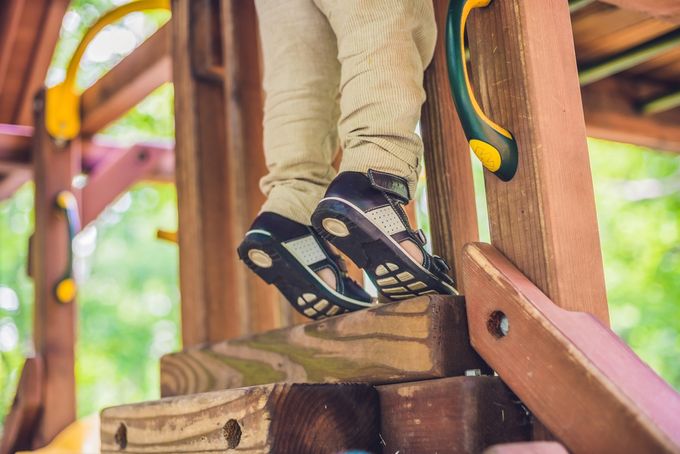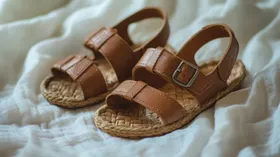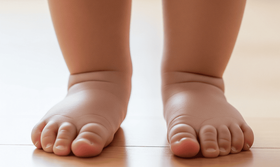Toe Walking Kids, do parents have reasons to worry?
Discover why children may toe walk, whether parents should be concerned about it, and how it can be addressed through this insightful article.
Updated June 10, 2025

Toe walking or walking on tiptoes is not uncommon amongst children. Toe walking is the unnatural walking gait wherein the heel does not contact the floor. This is very common to babies or toddlers who just started walking. In fact, many kids start walking on tiptoes. Toe walking will gradually lessen as the child gains balance and strength in walking. Some kids overcome toe walking in as short as three months after walking. To others, the gait develops into a fun habit that may continue for several years. Most children are over toe walking by the age of five.
Direct causes of toe walking are still unclear. Children are more likely to tip toe if they are bare feet. Toe walking is normal, and in most cases, parents do not need to worry about it. However, it can also be a symptom of a different underlying condition like autism, muscular dystrophy or cerebral palsy.
Your child can be toe walking out of habit or showing signs of a developmental disorder. How are you to know? Here are what parents need to watch out for;
- If toe walking continues after the age of two
- Your child is walking more than the average tip toe time is 25%
- Toe walking shouldn’t hinder or slow down development of other motor skills
- If your child develops stiff muscles
- Your child starts losing skills he or she previously had
- If your child is uncoordinated and has a waddling gait
- Your child is unable to stand straight or carry his weight on a flat foot
If you see any of these signs, it is strongly recommended that you see a doctor. The specialist will conduct a thorough physical exam and assessment of your child’s condition. The doctor will first try to rule out any possibilities of physical and developmental disorders. Your child can be perfectly fine or has a short Achilles tendon condition that causes the toe walk. This can be corrected with casting, a minor surgical procedure and other corrective solutions.
How to Help your Child Overcome Toe Walking
If your child is not showing any of the symptoms above and is cleared of any underlying conditions, it is most likely that your child is perfectly fine, he or she just love toe walking. However, continued toe walking will cause harm as the child gets older. Aside from the stigma of being different, walking on tiptoes also inhibits balance and coordination. The continued application of unnatural strain on the leg muscles can lead to stiffness, tightening of leg and calf muscles, pain in the Achilles tendon and other muscular problems.
Corrective therapy can be recommended for older children who are still toe walking. Here are ways to help their child overcome toe walking;
Stretching and strengthening exercises
A thorough consultation with an orthopaedic doctor and a physical therapist is required before you implement any form of stretching and muscle manipulating exercises. The doctors will design the appropriate stretching and strengthening exercise routine based on your child’s condition. The exercise program will usually include massages, stretches and feet exercises designed to strengthen leg muscles and stretch calf muscles.
Casting and bracing
Children five years old and above with more extreme cases of toe walking might need casting and bracing to correct the problem. This process calls for applying casts to re-align feet. Casts are applied by medical professionals and are adjusted until the desired results are achieved. Wearing braces are recommended for more extreme cases. This process requires the child to wear shoes attached to a bar. The shoes are appropriately aligned. Bracing will hinder movement and are mostly worn during naps and sleep time.
Supportive shoes
The appropriate pair of shoes can help resolve continued toe walking. Idiopathic toe walking, or toe walking without any medical significance usually happen when children are barefoot. They will walk normal once shod. Specially designed supportive shoes for kids include features that help the normal development of their growing feet. Special features like firm soles, arch inserts, supportive ankle braces, wide soles and sturdy heel supports improve balance, protect feet and support growing muscles.
First Walkers offers a collection of boots and high-tops specifically designed for kids with special needs and conditions including toe walking. We have orthopaedic and orthotic friendly shoes for kids from 6 months old to early teens. See the adorable designs and more details of our boots and high tops here.
Related Articles

Practical and Pretty: 10 Regular-Cut Sandals for Little Girls
Babafemi Adebajo
December 6, 2024

Types of Shoes for Kids That They Need in Their Wardrobe
First Walkers
June 10, 2025

5 Most Comfortable Shoes for Kids to Choose From
Jasrah Javed
September 23, 2024

7 Best Ergonomic Shoes for Toddlers: Supporting Every Step
Janik Sundstrom
March 15, 2025

10 Best Arch Support Shoes for Little Boys
First Walkers
September 13, 2025
